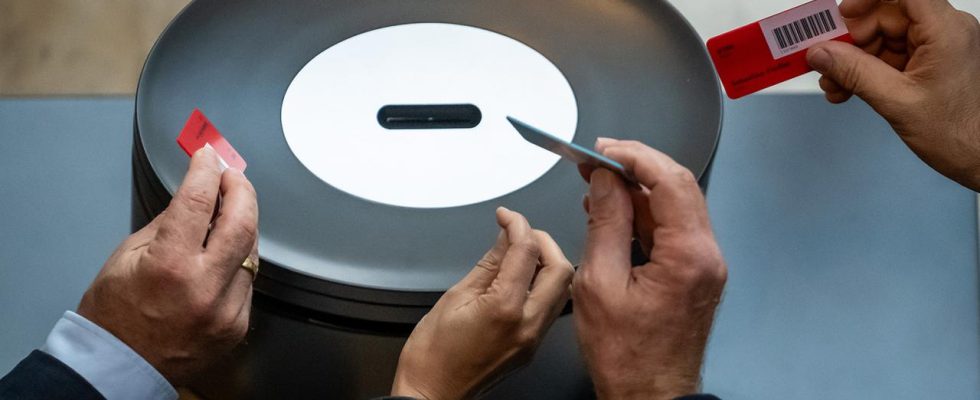analysis
Proposals for a new euthanasia law have failed in the Bundestag. For MEPs, the debate was a balancing act between protecting self-determination and protecting life. In the end, the gray area remained.
It is an emotional debate being held in the Bundestag today. Katrin Helling-Plahr says she has never stood at the lectern with such humility. She has also never given a speech that is so important for so many people. The FDP politician is a specialist lawyer for medical law. She illustrates her position on the subject of euthanasia with fates that she has witnessed in her everyday work.
She refers to seriously ill people who would have turned to the responsible Federal Institute for Drugs and Medical Devices (BfArM) in Bonn to be allowed to receive narcotics for suicide. All applications were rejected. According to Helling-Plahr, these people were left alone. She promotes a legal regulation that makes euthanasia possible. According to this, doctors should be allowed to prescribe drugs for suicide to adults – after consultation and in principle regulated outside of criminal law.
Karlsruhe verdict with explosive force
So today we are dealing with an important and life-changing question in the Bundestag: Should someone who wants to end their life be allowed to be legally supported by another person? Yes, the Federal Constitutional Court ruled in 2020, overturning the ban on “commercial” euthanasia.
“Business-like” has nothing to do with money, but means “designed to be repeated”. It was a verdict with explosive force that ended the five-year validity of a previously newly created Section 217 in the Criminal Code. A new legal regulation is not absolutely necessary. But the Karlsruhe judges suggested that Parliament adopt a protection concept to prevent abuse.
Balancing act for MPs
For the members of the Bundestag this means finding a balance between protecting self-determination and protecting life. Apart from the AfD, parliamentarians across parliamentary groups had drawn up two draft laws. The difference between the drafts lies in the specifications and details of the advice, but above all in the threat of punishment: if the duties of advice are not complied with, the stricter draft should continue to criminalize the commercial promotion of suicide. The competing, more liberal draft no longer provides for criminal liability here either.
SPD MP Lars Castellucci thinks that’s wrong. He campaigns for euthanasia to be anchored in criminal law again. Commercial, i.e. organized, euthanasia should therefore be prohibited. It should only be allowed in exceptional cases, if certain advisory duties and waiting times are observed. This includes at least two examinations by specialists in psychiatry and psychotherapy and at least one additional consultation. Violations are punishable by imprisonment of up to three years. A protection concept that has no consequences is not a protection concept, says Castellucci with a view to the draft by the group of deputies around the FDP politician Helling-Plahr.
At the beginning of the debate, it is unclear whether one of the two draft laws will receive a majority. The draft by the group around Castellucci also has supporters in the Union. More chances are credited to him. In any case, all three speakers from the CDU and CSU are in favor of the more restrictive regulation, as does Stephan Pilsinger.
The CSU MP refers to his work as a family doctor. He also looks after old people’s homes where euthanasia associations are active. The residents would be addressed there with the question of whether they want to continue to burden their relatives. In his view, this is an intolerable situation. He fears that vulnerable people such as the elderly or the sick could be put under pressure by overly liberal regulations. Pilsinger therefore advocates making assisted suicide possible and ending the currently unregulated situation, but with a clear protection concept and anchored in criminal law, as provided for in Castellucci’s draft.
Continue in the unregulated state
In the end, however, neither of the two proposals got a majority. In roll-call votes, the draft led by MP Castellucci received 304 yes votes and 363 MPs voted against. 287 MEPs are in favor of the Helling-Plahr group’s proposal, while 375 are against it.
It’s a shame, says Renate Künast. The Green politician had spoken out in favor of the more liberal proposal. She is glad that Castellucci’s proposal did not go through with the regulation in criminal law. But she doesn’t think it’s good that suicide assistance is still possible without regulation.
The FDP MP Benjamin Strasser, who had advocated the more restrictive draft, sees it similarly. Those affected are now still exposed to a gray area of opaque euthanasia organizations without a protection concept, says Strasser. Despite the rejection, his group received by far the most votes from the MPs. Therefore, with a little distance to today’s decisions, they want to discuss whether and how to make a new start in the legislative period.
suicide prevention should be strengthened
The Federal Minister of Health also regrets that none of the motions received a majority today. As a member of parliament, Karl Lauterbach had favored the more liberal draft. As Minister, he now sees it as his duty to work on a national suicide prevention plan.
Because the MPs agree on one point today: Suicide prevention should be strengthened. With a large majority, the members of parliament call on the federal government to present a corresponding strategy. This should guarantee that people with suicidal thoughts and their relatives can get help quickly online or by phone. A nationwide suicide prevention service is to be set up using telephone counseling and social psychiatric services. According to Lauterbach, he wants to take up the MPs’ suggestions and present a plan after the summer break.

